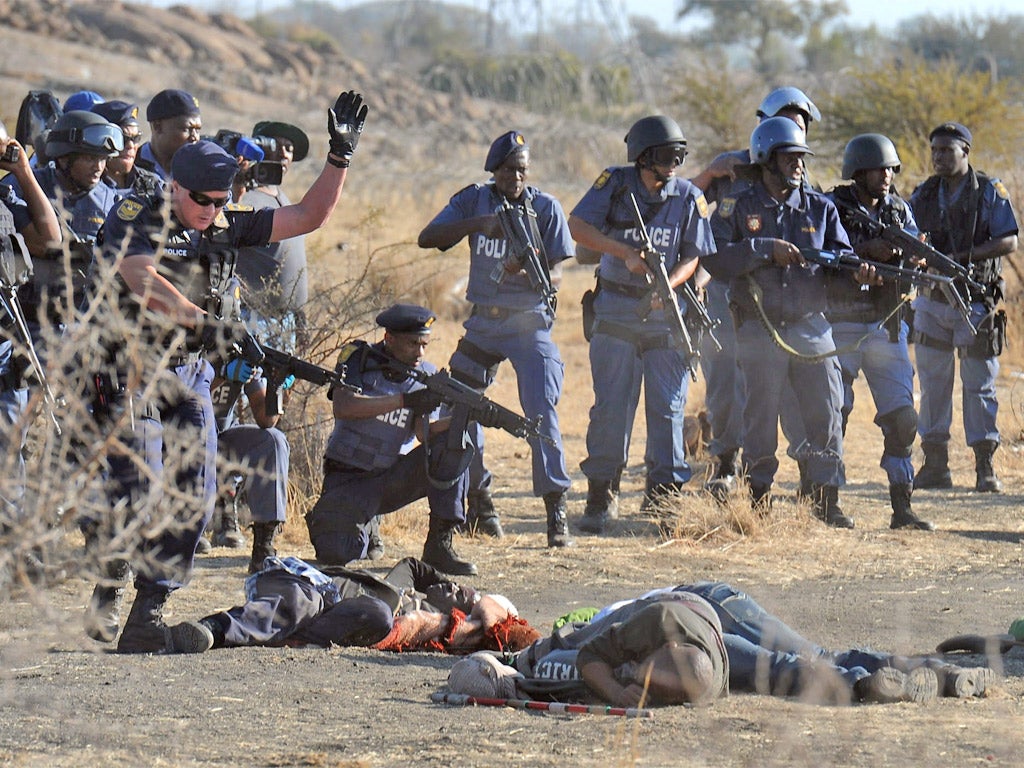Marikana mine victims: police 'planted' weapons
Photos of protest, in which 34 miners were killed, back claims that South African officers tampered with the crime scene

Two sets of photographs taken during and after the Marikana miners' massacre in South Africa have led to accusations that weapons may have been planted on their bodies by police.
One set of pictures taken at night on 16 August after 34 striking mine workers were shot dead by police show traditional weapons, including machetes and spears, next to several of the corpses. Another series shot earlier that day show a number of the same victims to be unarmed.
The veteran human rights lawyer, George Bizos, accused the police of tampering with the crime scene. "There was a deliberate attempt to defeat the ends of justice after the events took place," he told a commission of inquiry into the killings.
The Marikana deaths were the worst state violence since the end of apartheid in 1994 and have led to calls for South Africa's President, Jacob Zuma, to stand down as leader of the ruling African National Congress (ANC). Forty-six people including two policemen were killed during six weeks of strikes at the platinum mine northwest of Johannesburg.
Police accounts of the killings said that thousands of striking workers armed with traditional weapons had charged police lines forcing officers to first fire rubber bullets then automatic weapons into the mob.
The 16 August killings followed lethal clashes between members of two rival mining unions in which police had been killed.
Mr Bizos, who came to prominence defending Nelson Mandela at the 1963 Rivonia trial in which he escaped the death penalty, reviewed photographic evidence and called on the senior police officers responsible for the scene to give evidence to the commission, which will take four months to reach a conclusion.
In one set of photos a man's mangled dead body lies alone in the daylight, and in a picture taken with a flash after dark, there is a machete placed under his hand. The crime scene photographer, Captain Apollo Mohlaki, admitted that his later photographs showed more weapons than those taken earlier. Some police officials blamed the discrepancies on paramedics, who they claimed had removed the weapons while treating victims and later replaced them at the scene.
Videos watched by the commission also appeared to show that some of the dead miners were handcuffed, which would also contradict police accounts. In the immediate aftermath police sought to portray the striking workers as responsible for the violence. There was a national outcry when 270 of them were charged with murder over the August killings. Those charges, brought under laws dating back to the Apartheid era, were later dropped.
The Marikana massacre came amid escalating tensions between South African authorities and the country's disadvantaged black majority who feel left out of the economic benefits post-Apartheid. The former ANC Youth League leader Julius Malema, who has been expelled from the ruling party, exploited the killings to reiterate his calls for South Africa's mines to be nationalised.
Mining companies have warned that further state interference would be a disaster for the economically important sector. The government also opposes nationalisation but mining giant Lonmin was forced to climbdown after the marathon strikes by offering up to 22 per cent wage increases to miners and a one-off payment of $244 (£144).
President Zuma was accused of "going missing" in the wake of the miners' massacre and has been embroiled in a scandal over the use of public money to make improvements at his rural homestead in KwaZulu Natal. Most analysts expect him to retain his leadership of the ruling ANC at a party congress next month but a challenge from his vice president Kgalema Motlanthe is widely anticipated.
Join our commenting forum
Join thought-provoking conversations, follow other Independent readers and see their replies
Comments